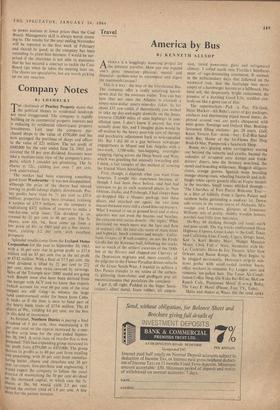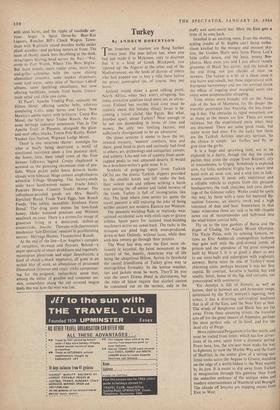Travel
America by Bus
By KENNETH ALLSOP
AMERICA is a bogglingly daunting project for the amateur traveller. How can one expand one's puny resources--physical, mental-. and financial—python-wise to encompass and digest the mammoth carcass?
This is a way: the way of the Greyhound Bus. The company offer a really satisfying knock- down deal for the overseas visitor. You can buy here (but not once the Atlantic is crossed) a ninety-nine-dollar ninety-nine-day ticket. So for about £35 you could, if theoretically you wished to take up day-and-night domicile on the ,buies, traverse 120,000 miles of state highways in your allotted span. I don't know if anyone has ever actually done this, and 1 imagine gains would be off-written by the heavy post-trip cost .of therapy and psychiatric adjustment back to non-capsuled life. But I did fill in a gap between newspaper engagements in Miami and Los Angeles with a two-week, 3,500-mile, bus-hopping, overnight- stopping zigzag across the Deep South and West, which was gruelling but intensely rewarding and. I think, a fair sampler of this method of scouting the United States hinterland.
First, though, it depends what you want from America. I sought this experience because, al- though I had been there before, and had had occasion to go to such scattered places as New Orleans, Dallas and Pittsburgh. I had always been air-dropped like a Maquis package into these places and snatched out again; the vast land masses between were still a clouc143lurred mystery. What I wanted to see at ground level and at close quarters was not even the bayous and beaches. the canyons and cactus deserts—the 'sights.' What interested me much more was the face and flow of ordinary life, the inter-city scene of main street and highway, lunch counters and motels: Lolito- land, Gropes of Wrath country, on not the Ferde Groffe but the Kerouac trail, following the tracks not so much of the settlers' caravans of the 1840s but of the flivvers and clapped-out Chevvys of the Depression migrants and, more recently, of the pilgrims to the Flower Paradise dream suburbs of the Great South-West, I wanted to achieve a Dos Passos transfer to my retina of the authen- tic glittering slum-clutter and profligate pop in meretriciousness that pustulates the continent.
I got it, all right. Podded in the Super Sceni- cruiser's silver metal, foam rubber, air suspen-
sion, tinted panoramic glass and refrigerated climate, I rolled north into Florida's bombard- ment of sign-detonating commerce. It seemed, in the hallucinatory days that followed on the westward trek, that the landscape was never empty of a hamburger heaven or a billboard. The hard sell, the desperately bright enticement, the promise of a dazzling Good Life, scudded end- lessly on like a giant can of film.
The supermarkets—Pick 'n Pay, Pik-Quik, Minit Market—Ali Baba's caves of gay packages, coolness and murmuring piped mood music, de- ployed around vast car parks chequered with mint green, flamingo and Oxford blue. Bunting- festooned filling stations: gas 20 cents, Gulf, Kayo, Texaco. Eat--drink—buy: E-Z-Bite Sand: wich Bar, Home of the Jet-Flown Hot Dog, Broil-O-Mat, Pumpernik's Sandwich Shop.
Route 66's glaring white carriageway searing out beyond the suburbs and exurbs, beyond the redoubts of scrapped auto dumps and truck- drivers' diners, into the thruway non-land, the motel-and-hoarding wilderness. Sluggish alligator rivers, orange groves, Spanish moss bearding mango swamp trees, wheeling buzzards and stab- bingly white egrets gauntly chic as Vogue models in the marshes. Small towns whisked through— 'The Churches of Fort Pierce Welcome You'— in a blur of hillbilly from a Sports Palace and rainbow bulbs garlanding a used-car lot. Down side streets in the route towns of Alabama, Mis- sissippi and Louisiana, glimpses of Tennessee Williams sets of pretty, shabby wooden houses, porche's and frilly iron balconies.
Hi-Way 90 slashing through red sandy earth and pine scrub. The big trucks emblazoned Dixie Highway Express, Great Lakes to the Gulf, Texas and California Line. Candy, Cigars, Drugs; Snax, Kut 'n Kurt Beauty Mart; Midget Mansion Motel; Chok Full o' Nuts; Slenderize with Hi- Lo; Cocktails; Drive-1n Joy Theatre. After New Orleans and Baton Rouge, the West begins to he plugged persistently. Houston's strip-lit win- dows gothic with scroll-tooled cowboy boots, office workers in romantic Ivy League suits and romantic 'ten-gallon hats. The Lasso Air-Condi- • tioned Coffee Shop, Ox-Yoke Bar-B-Cue, McCow Ranch Cafe, Plainsman Motel (L-o-n-g Beds), The Lazy E Motel (Phone, Free TV, Tubs).
Kalts and shakes at Waco. On the road, spiky with steel barns, and the ripple of roadside ser- vices: Sugar 'n Spice Drive-In, Bear-Kat Liquors, Rancher Bill's Chuck Wagon. Town- ships with B-picture raised wooden walks under plank arcades—and parking meters in front. The neon of shanty snack bars throbbing in the dusk, skyscrapers blazing head across the flats—'Wel- come to Fort Worth, Where The West Begins.' But more motels, more trailer cities, more bar- and-grills--cafeterias with the same shining aluminium counters, same napkin dispensers, same iced water, same ooze of Norman Luboff albums, same sparkling cleanliness, but now offering enchilado, tamale fried beans, Guaca- male salad and chile con carne.
El Paso's Apache Trading Post, opposite the Hilton Hotel, offering concho belts, ashtrays simulating Colts, steer horns and Levis. New Mexico's adobe starry with brilliants: Camp Rio Motel, the Silver Spur Trailer Ranch. An Ari- zona heritage indicator announces This Is The Apache Trail; in Phoenix, alongside the glass- and-steel office blocks, Totem Pole Realty, Rebel- Yankee Gas Station, Wigwam Lodge Motel.
There is one recurrent theme: nostalgia for what is busily being destroyed, a motif of emotional insistence upon a lost pastoral idyll, the homy, lazy, hazy small town of the Tom Sawyer folkways legend. Crusty clapboard is screwed on the gleaming chromium rind of pre- fabs. White picket pales fence drive-in banks cloudy with hibiscus. Huge cement amphitheatres advertise Village Shopping. The factory-made units have hand-woven names: Uncle John's Pancake House, Country Smoke House. The cellophane-proofed goods are Mrs. Baird's Enriched Bread, Fresh• Yard Eggs, Sun Ranch Foods, 'The edible, incredible, Southern Farm Bread.' The drug store menus list hive-fresh honey, Idaho buttered potatoes and Western sandwich on toast. There is a striven-for image of grassroot living in a denatured, dolled-up countryside, bucolic Thoreau-with-,thermostats residential 'Sub-Division' sunsites in proliferating , estates: Heritage Homes, Thunderbird Ranch.
At the end of the line—Los Angeles's complex • of turnpikes, skyways and flyovers. Behind—a super spectacle of smart shoddiness and ingenuity, masstopian plentitude and eager despoliation, a kind of chock-a-block emptiness, all gone in an orchid blur of neon, an abundance of processed Disneyland romance and rustic tricks compensat- ing for the poignant, melancholy sense that, among the welter of goodies and consumer ser- vice, somewhere along the old covered wagon trails this was how the west was lost.



































 Previous page
Previous page